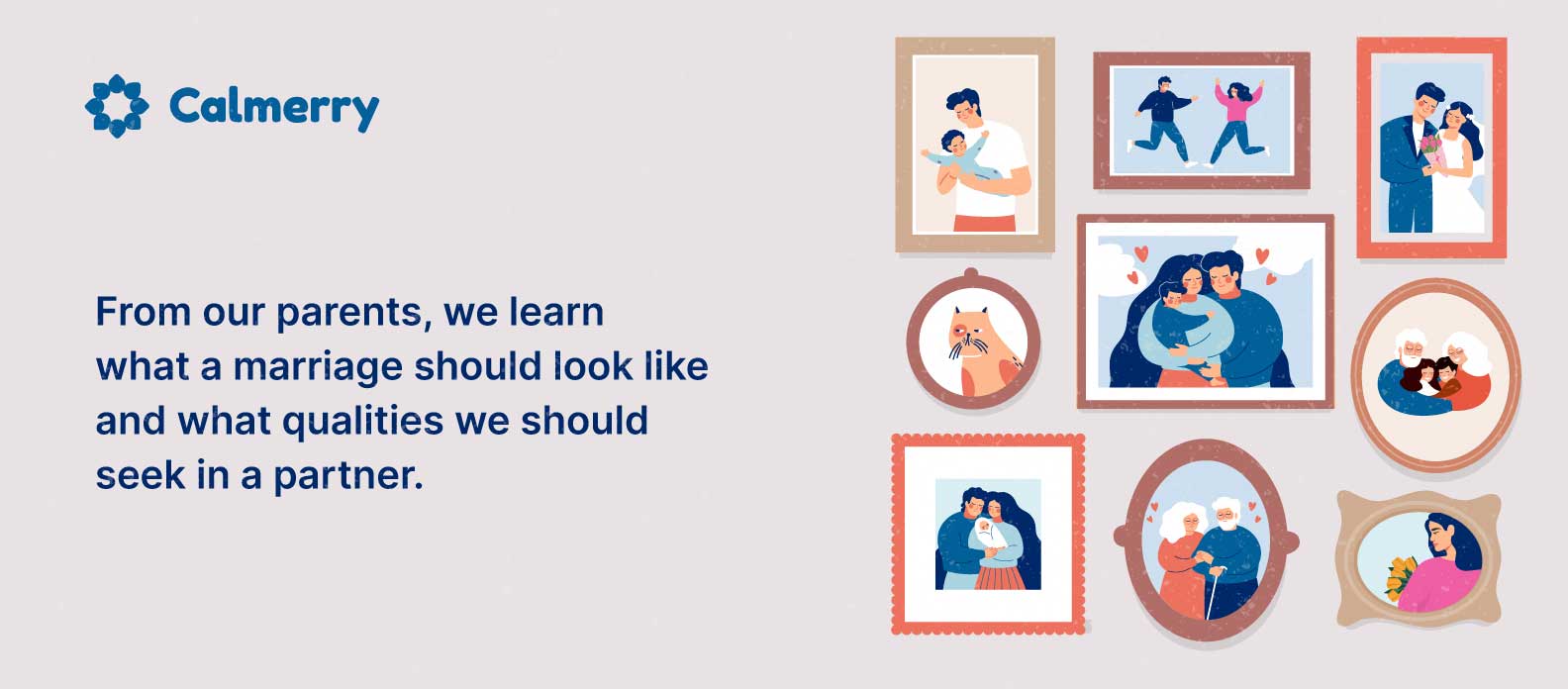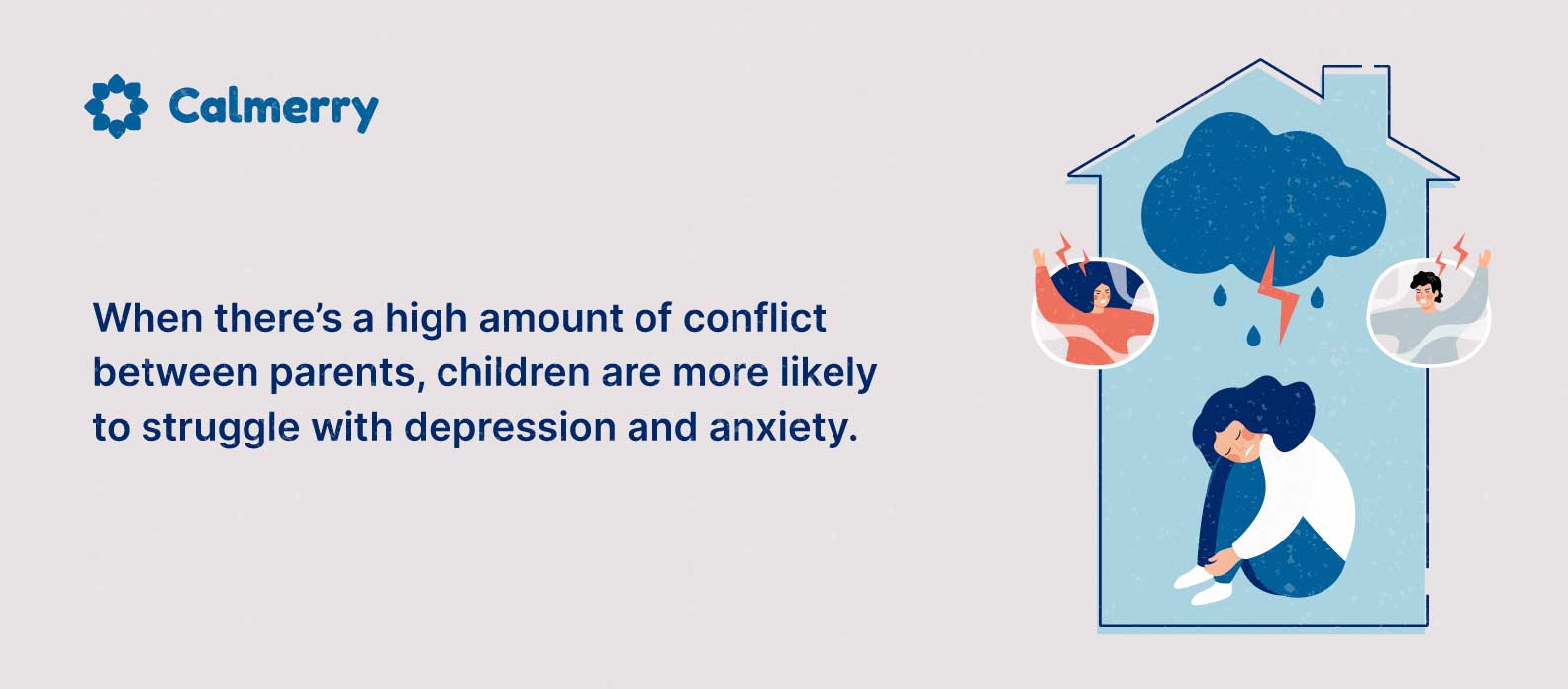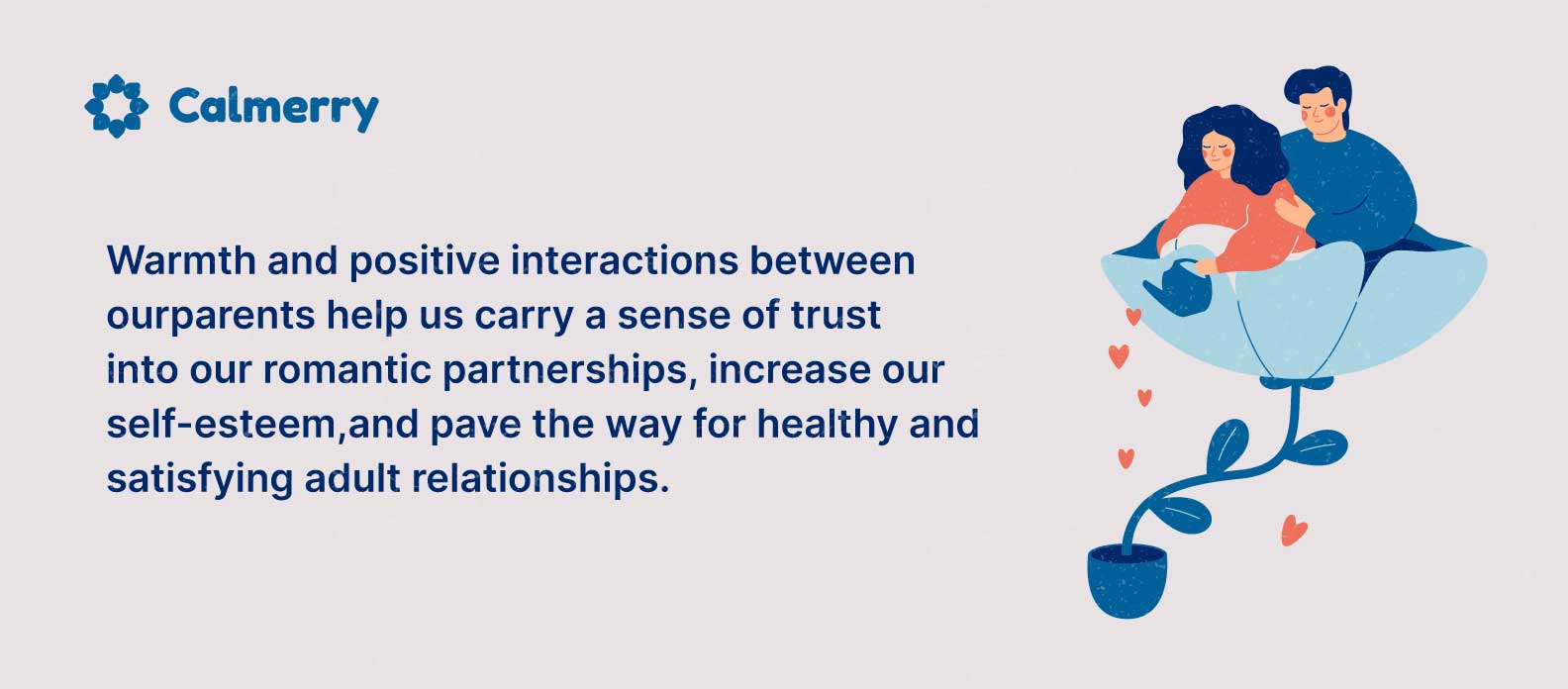How Our Parents’ Marriage Affects Our Relationships and Shapes Us

In this article
Our parents are the first teachers we have, and we can count on them to teach us everything — from how to eat with a spoon to how to behave in public. These may be some of the more obvious lessons we learn from our parents. But from the time we’re old enough to observe adults, they are teaching us another important lesson — how relationships should be.
Given that our parents’ marriage provides a blueprint for what we can expect from relationships, it can affect us well into adulthood. Here, learn how our parents affect our relationships and how their marriage influences our mental well-being.
How our parents affect our relationships in adulthood

While we may not realize it, even as young children, we absorb the behavior and interactions of people around us, especially our parents, since we tend to spend the most time with them. From our parents, we learn what a marriage should look like and what qualities we should seek in a partner. Our parents’ relationship can also give us an idea about what marriage means.
It is no surprise, then, that problems in our parents’ relationships can lessen the quality of our own relationships during adulthood, according to research. A study in the Journal of Adult Development found that young adults whose parents had a great deal of conflict, but did not divorce, experienced their share of problems.
Study results showed the following:
- When there was more conflict in their parents’ marriage, children were less committed to and less satisfied with their romantic relationships during young adulthood.
- Witnessing a high level of conflict between parents can also lead to negative views toward marriage. The study indicated that adult children of parents who had conflictual marriages were more likely to favor divorce.
These findings suggest that when our parents are constantly involved in a conflict, we come to view marriage negatively. We become more supportive of divorce and less likely to commit to a relationship.

How your parents’ relationship affects your love life as an adult
As the research above suggests, our parents’ marriage can lead us to struggle in our own adult relationships if their marriage is conflicted. Not only does conflict between our parents lead us to be more supportive of divorce and less committed to relationships. It can also lead to poor communication in our adult relationships and insecure attachment styles.
Insecure attachment can make it difficult to have a satisfying love life as an adult, according to researchers writing for the journal Personality and Individual Differences. This is because this type of attachment means that you may be distrustful of partners and fearful of abandonment instead of being able to form secure, intimate bonds.
If your parents often argued and had heated conflicts, your love life may also be rather conflicted. Based on what you learned from your parents, you are more likely to have difficulty trusting and communicating in romantic relationships.
How do parents shape our identity?
Given that our parents’ marriage can influence our attitudes and function in adult romantic relationships, their marriage can also influence our identity as adults. One important area of identity shaped by our parents’ marriage is our values.
A study found that parents’ marriage quality influenced children’s values in the following ways:
- When parents’ marital quality was high, adult children were less likely to accept the ideas of premarital sex or divorce as being options.
- When parents have a happy marriage, their children may view them as acceptable models. Therefore, they are more likely to endorse the idea of marrying and conforming to traditional family values.
- On the other hand, if the parents’ marriage quality is low, adult children may learn that marriage is not something to be valued. Consequently, they are more likely to accept alternatives like divorce and premarital cohabitation as being options.
The impact of our parents’ marriage on mental well-being

Beyond shaping our values, the marriage between our parents can influence our mental well-being. Research suggests that when there is a high amount of conflict between parents, children are more likely to struggle with depression and anxiety.
A report in a 2020 publication of Cogent Psychology confirmed this finding. In the report, researchers reviewed the results of 23 different studies and found the following to be true:
- When parents’ marriage quality is high, children show higher levels of psychological well-being.
- On the other hand, when parental marital quality is lower, children are less likely to demonstrate high psychological well-being.
- In the 23 studies that researchers assessed, psychological well-being was defined as happiness, high self-esteem, optimism, and positive affect. And high marriage quality includes marital satisfaction, warmth, and positivity between spouses.
- On the other hand, low marriage quality was characterized by conflict, hostility, and fighting.
So, healthy marriages characterized by positive emotions are beneficial for children’s self-esteem and happiness. Conversely, marriages high in conflict and hostility can damage psychological well-being. In fact, the unhappiness in a low-quality marriage can be passed on to the children.
Putting it all together: How we’re shaped by our parents’ relationship and what we can do to cope with the challenges
As research on marriage, family, and relationships has shown, our parents’ marriage shapes us well into adulthood.
When we observe our parents, we pick up on their emotions and interaction patterns and accept them as normal. If we observe parents in a high-conflict marriage, we can experience the following beliefs:
- That marriages are, by nature, hostile
- That conflict resolution requires heated arguments and name-calling
- That marriage is negative
We can also experience these challenges as adults:
- Being unable to resolve conflicts in a healthy manner
- Struggling to form close bonds or secure attachments in romantic relationships because of the fear of being hurt
On the other hand, if our parents’ marriage is warm and loving, we believe that marriage is a positive and largely beneficial type of union. Warmth and positive interactions between our parents also help us carry a sense of trust into our romantic partnerships, increase our self-esteem, and pave the way for healthy and satisfying adult relationships.

While our parents’ marriage can shape us, we can develop new habits and learn to manage emotions in a healthy way, even if our parents’ marriage was rife with conflict.
If you’re struggling with low self-esteem, depression, anxiety, or your own relationship issues, therapy can provide a safe space for you to process these concerns. This will allow you to overcome childhood trauma and pain that may be contributing to problems in adulthood. Online therapy is an option worth considering, offering the convenience of accessing relationship therapy or individual counseling from your own home, making it more accessible to work through these concerns.
Closing thoughts
Your parents may have taught you what their relationship looked like. But you do not have to repeat their habits, especially if they were not healthy. If you’re juggling the demands of a busy lifestyle, online therapy on Calmerry can provide a safe space for you to receive help from a therapist — at times and locations convenient for you.
online therapy
live video session


